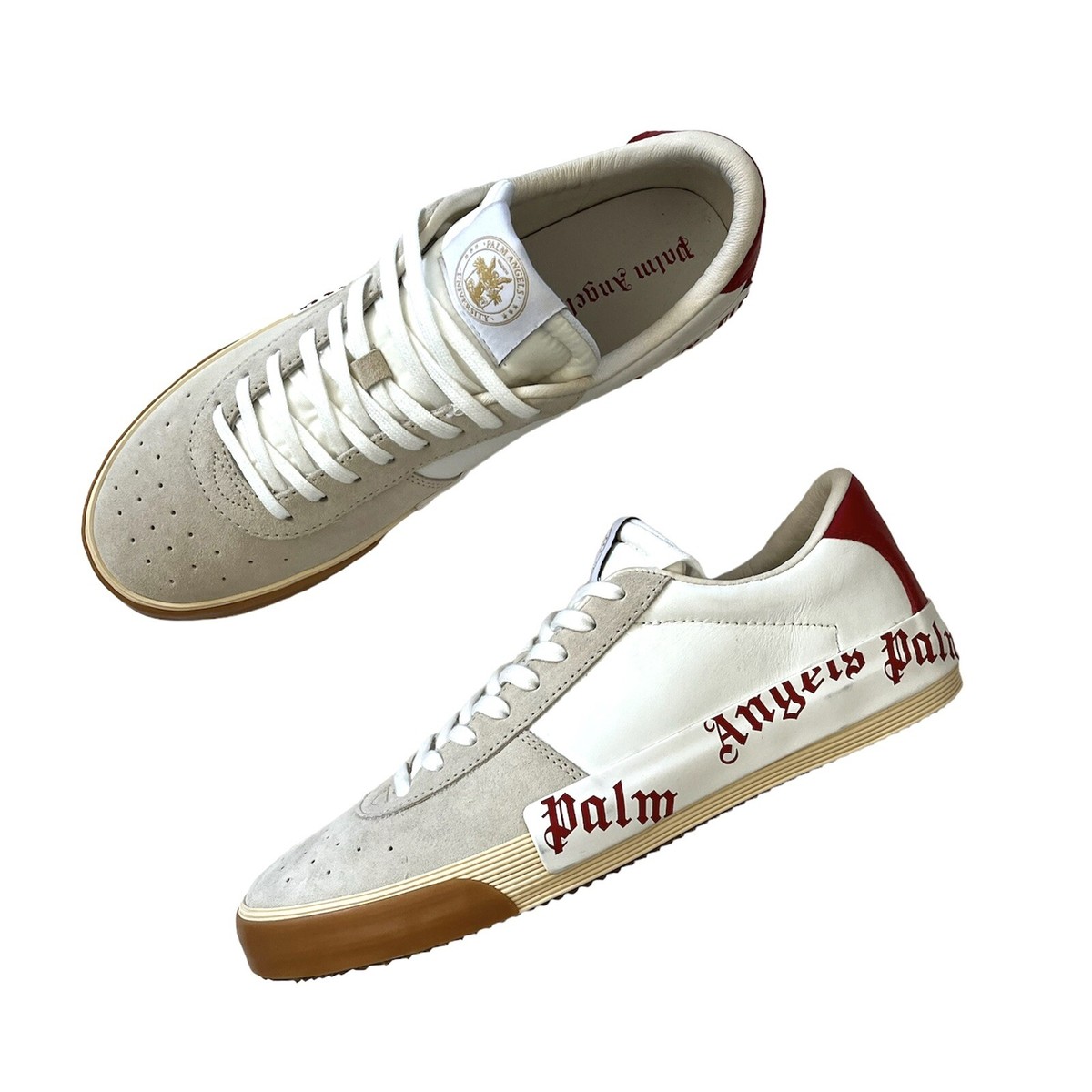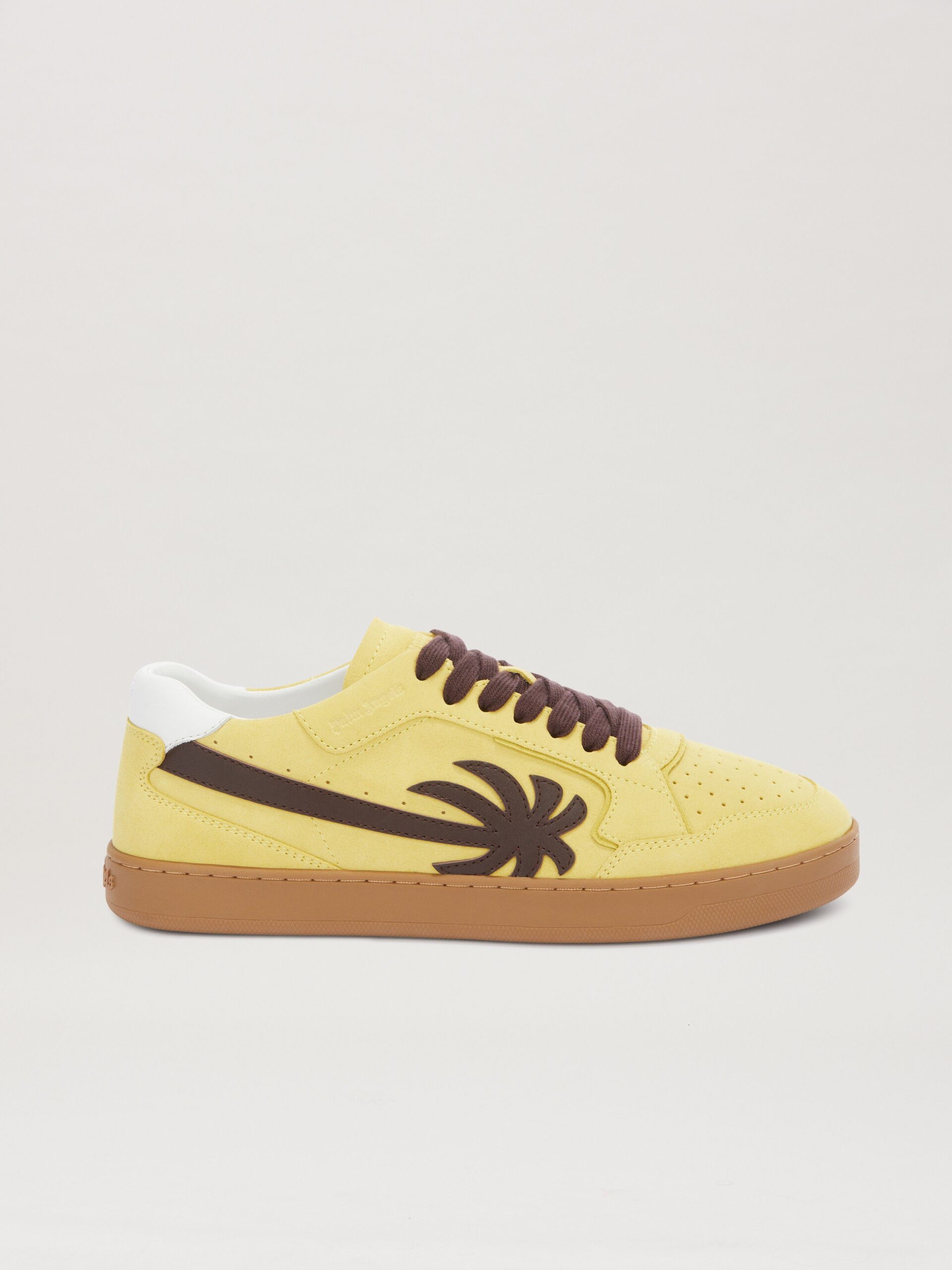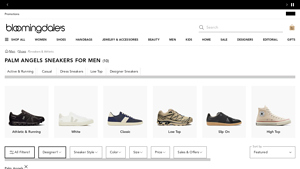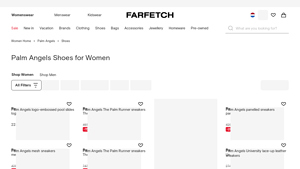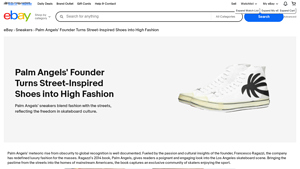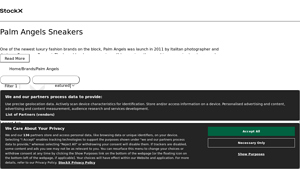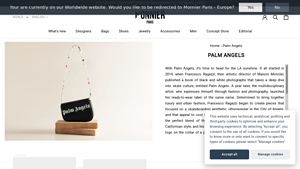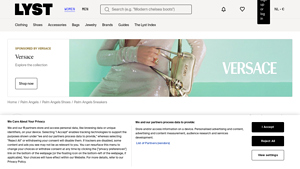Palm Angels Shoes Guide: Type,Cost,Material…
Introduction: Navigating the Global Market for palm angels shoes
In today’s rapidly evolving fashion landscape, international B2B buyers face the challenge of sourcing high-quality, trendy footwear that resonates with diverse markets. Palm Angels shoes, known for their distinctive blend of streetwear aesthetics and luxury craftsmanship, present a compelling opportunity for businesses looking to enhance their product offerings. This guide serves as a comprehensive resource for understanding the various types of Palm Angels shoes available, including sneakers, sandals, and slides, along with their applications in both casual and high-fashion contexts.
As you navigate this global market, you will gain insights into the essential aspects of supplier vetting, pricing strategies, and market trends that influence purchasing decisions. The guide not only addresses the practicalities of sourcing Palm Angels shoes but also highlights the brand’s cultural significance and appeal in regions such as Africa, South America, the Middle East, and Europe, including burgeoning markets like Vietnam and Nigeria.
By equipping B2B buyers with actionable knowledge and strategies, this guide empowers you to make informed purchasing decisions that align with your business goals and consumer preferences. Whether you are seeking to establish a new retail line or enhance an existing collection, understanding the dynamics of Palm Angels shoes will be instrumental in achieving your objectives in the competitive footwear sector.
Understanding palm angels shoes Types and Variations
| Type Name | Key Distinguishing Features | Primary B2B Applications | Brief Pros & Cons for Buyers |
|---|---|---|---|
| Sneakers | High-end designer footwear with streetwear aesthetics | Retail, e-commerce, fashion boutiques | Pros: Trendy, versatile; Cons: High price point. |
| Slides | Casual slip-on footwear with logo branding | Casual wear stores, beachwear retailers | Pros: Easy to wear, comfortable; Cons: Limited use in formal settings. |
| Mules | Stylish backless shoes that combine comfort and chic design | High-end fashion retailers | Pros: Fashion-forward, easy to style; Cons: Can be less supportive. |
| Sandals | Open-toe footwear featuring bold designs and branding | Summer collections, resort wear outlets | Pros: Breathable, trendy; Cons: Seasonal demand fluctuations. |
| Boots | Fashionable ankle and combat boots suitable for various styles | Urban fashion retailers, online marketplaces | Pros: Durable, versatile; Cons: Bulkier, can be more expensive. |
What Are the Key Features of Palm Angels Sneakers for B2B Buyers?
Palm Angels sneakers are characterized by their bold designs and high-quality materials, blending luxury with streetwear culture. These shoes often feature unique colorways, innovative silhouettes, and branding that appeals to a younger demographic. For B2B buyers, investing in Palm Angels sneakers means offering products that align with current fashion trends, appealing to customers seeking statement pieces. However, the higher price point may limit accessibility for some segments of the market.
How Do Palm Angels Slides Stand Out in the Market?
Slides from Palm Angels are designed for comfort and ease of wear, showcasing distinct branding and often colorful designs. These casual footwear options are perfect for retailers focusing on summer collections or resort wear. B2B buyers should consider the seasonal nature of slides, as demand may peak during warmer months. While they are easy to stock and sell, their limited application in formal or business settings could restrict their market potential.
What Makes Palm Angels Mules a Fashion Statement?
Mules by Palm Angels combine comfort with a chic aesthetic, making them a popular choice among fashion-forward consumers. Their backless design allows for easy wear, while the distinctive styles often feature bold colors and branding. B2B buyers should evaluate the target market’s preferences for casual yet stylish footwear, as mules can be a versatile addition to any collection. However, the lack of ankle support may deter some customers, highlighting the need for clear communication about product features.
Why Are Palm Angels Sandals a Seasonal Favorite?
Palm Angels sandals are known for their striking designs and branding, making them a favorite in the summer footwear market. These open-toe options provide breathability and comfort, appealing to consumers looking for stylish yet functional footwear. For B2B buyers, stocking Palm Angels sandals can enhance a retailer’s summer offerings, but they must be mindful of the seasonal demand that may lead to fluctuating sales. Understanding the target demographic’s preferences is crucial for successful inventory management.
What Should B2B Buyers Consider When Purchasing Palm Angels Boots?
Palm Angels boots, including combat and ankle styles, offer a fashionable option for consumers seeking durability and versatility. These boots often incorporate high-quality materials and unique designs, making them suitable for various fashion contexts. B2B buyers should consider the boots’ appeal to urban fashion retailers and the potential for year-round sales. However, the bulkier design and higher price may pose challenges in terms of inventory turnover, necessitating strategic marketing approaches to drive sales.
Key Industrial Applications of palm angels shoes
| Industry/Sector | Specific Application of palm angels shoes | Value/Benefit for the Business | Key Sourcing Considerations for this Application |
|---|---|---|---|
| Fashion Retail | High-end sneaker collections for urban fashion | Attracts fashion-forward clientele, boosts brand image | Quality assurance, brand authenticity, shipping logistics |
| Sports & Recreation | Casual athletic wear for lifestyle branding | Enhances brand visibility in lifestyle and sports markets | Supplier reliability, compliance with athletic standards |
| Tourism & Hospitality | Stylish footwear for luxury resorts and events | Elevates guest experience, aligns with luxury branding | Customization options, seasonal availability, pricing |
| Event Management | Merchandise for music festivals and pop-up events | Increases revenue through exclusive branded items | Scalability, lead times, design exclusivity |
| E-commerce | Online retail of luxury streetwear footwear | Expands market reach, caters to global fashion trends | Digital marketing strategies, competitive pricing, logistics |
How Are Palm Angels Shoes Used in the Fashion Retail Sector?
In the fashion retail industry, Palm Angels shoes are utilized as high-end sneaker collections that cater to urban fashion enthusiasts. Retailers can leverage these bold designs to attract a clientele that values both style and exclusivity. The shoes not only enhance the store’s brand image but also cater to the growing demand for luxury streetwear. B2B buyers in this sector should prioritize quality assurance and brand authenticity while ensuring effective shipping logistics to meet customer expectations.
What Role Do Palm Angels Shoes Play in Sports & Recreation?
In the sports and recreation sector, Palm Angels shoes serve as stylish casual athletic wear that resonates with lifestyle branding. Brands looking to enhance their visibility in both lifestyle and sports markets can benefit significantly from incorporating these shoes into their product offerings. B2B buyers must consider supplier reliability and compliance with athletic standards to ensure that the products meet market demands and maintain brand integrity.
How Can Palm Angels Shoes Enhance Guest Experiences in Tourism & Hospitality?
In tourism and hospitality, Palm Angels shoes are an excellent choice for luxury resorts and events, providing stylish footwear that elevates the guest experience. By offering these trendy shoes, hotels can align their services with luxury branding, thereby attracting discerning travelers. Buyers in this industry should look for customization options, seasonal availability, and pricing strategies that align with their target market to maximize profitability.
Why Are Palm Angels Shoes Ideal for Event Management?
Event management companies can leverage Palm Angels shoes as exclusive merchandise for music festivals and pop-up events. The unique designs and brand appeal can drive revenue through merchandise sales, creating a memorable experience for attendees. B2B buyers should consider scalability, lead times, and design exclusivity to ensure that they can meet demand while maintaining the brand’s image at high-profile events.
How Do Palm Angels Shoes Fit into E-commerce Strategies?
In the e-commerce sector, Palm Angels shoes represent a lucrative opportunity for online retailers specializing in luxury streetwear. By expanding market reach and catering to global fashion trends, these shoes can significantly enhance an e-commerce platform’s offerings. Buyers should focus on developing effective digital marketing strategies, competitive pricing, and efficient logistics to capitalize on the growing demand for online luxury fashion.
3 Common User Pain Points for ‘palm angels shoes’ & Their Solutions
Scenario 1: Sourcing Genuine Palm Angels Shoes in Competitive Markets
The Problem: B2B buyers, particularly in regions such as Africa and South America, often face significant challenges in sourcing genuine Palm Angels shoes. The presence of counterfeit products in the market can lead to financial losses and brand reputation damage. Additionally, the lack of reliable suppliers or distribution channels can complicate the procurement process, making it difficult for retailers to maintain an appealing inventory of authentic luxury streetwear.
The Solution: To effectively source genuine Palm Angels shoes, B2B buyers should focus on establishing relationships with authorized distributors and verified retailers. Conduct thorough research to identify suppliers with a proven track record of dealing in authentic luxury footwear. Utilize industry connections, attend trade shows, and leverage online platforms that specialize in luxury goods to find reputable sources. Additionally, implementing a system for verifying product authenticity—such as requiring certificates of authenticity or detailed provenance documentation—can mitigate risks associated with counterfeit products. By prioritizing partnerships with trustworthy suppliers, buyers can ensure their inventory remains authentic and appealing to discerning customers.
Scenario 2: Addressing Size and Fit Concerns for Diverse Markets
The Problem: Palm Angels shoes often come in European sizing, which can lead to confusion and dissatisfaction among customers in regions with different sizing standards, such as Nigeria and Vietnam. Misunderstanding size conversions can result in increased return rates, lost sales, and frustrated customers, ultimately impacting a retailer’s bottom line.
The Solution: B2B buyers should proactively address sizing issues by providing comprehensive size guides that include both European and local size conversions. Incorporating detailed product descriptions that highlight the fit (e.g., true to size, narrow, wide) can further assist customers in making informed decisions. Additionally, offering a flexible return policy can encourage customers to try different sizes without the fear of being stuck with ill-fitting shoes. Retailers may also consider stocking a range of sizes based on regional demand forecasts to cater to local preferences. Engaging with customers through surveys or feedback forms can help gather insights on size preferences, further refining inventory decisions.
Scenario 3: Navigating High Price Points in Budget-Conscious Markets
The Problem: Palm Angels shoes are positioned in the luxury segment, which can be a barrier for retailers operating in budget-conscious markets. Buyers may struggle to justify the high price points to their customer base, which can limit sales potential and hinder market penetration.
The Solution: To overcome price sensitivity, B2B buyers can adopt a multi-faceted approach. First, highlighting the unique selling propositions (USPs) of Palm Angels shoes—such as their exclusive designs, quality craftsmanship, and cultural relevance—can help justify the investment to potential customers. Creating compelling marketing campaigns that emphasize the brand’s streetwear heritage and lifestyle appeal can enhance perceived value. Additionally, retailers can explore offering installment payment options or limited-time promotions to make the products more accessible. Building a narrative around the brand’s exclusivity and its fit within a lifestyle choice can also resonate with consumers, encouraging them to invest in luxury footwear as a long-term fashion statement rather than a mere purchase.
Strategic Material Selection Guide for palm angels shoes
What Are the Key Materials Used in Palm Angels Shoes?
When considering the strategic material selection for Palm Angels shoes, it is essential to analyze the common materials utilized in their construction. This analysis will provide insights into their properties, advantages, limitations, and relevance for international B2B buyers, especially in diverse markets such as Africa, South America, the Middle East, and Europe.
How Does Leather Enhance the Performance of Palm Angels Shoes?
Leather is a primary material in many Palm Angels shoes, particularly in high-end sneakers and sandals. Its key properties include excellent durability, breathability, and a natural aesthetic appeal. Leather can withstand varying temperatures, making it suitable for different climates.
Pros: Leather offers superior comfort and a luxurious feel, enhancing the overall customer experience. It is also highly durable, which contributes to the longevity of the footwear.
Cons: However, leather can be more expensive than synthetic alternatives and may require specific care to maintain its appearance. Additionally, its manufacturing process can be complex, requiring skilled labor.
Impact on Application: Leather shoes are well-suited for fashion-forward consumers who prioritize style and quality. However, buyers should ensure compliance with international standards such as ASTM for leather quality.
What Role Does Suede Play in Palm Angels Footwear?
Suede, a type of leather with a soft, napped finish, is often used in Palm Angels shoes for its unique texture and aesthetic appeal. It provides a luxurious look while maintaining breathability.
Pros: Suede is lightweight and offers a distinctive style that appeals to fashion-conscious consumers. It is also generally more affordable than full-grain leather.
Cons: On the downside, suede is less durable than traditional leather and can be more susceptible to stains and moisture damage. This can limit its application in regions with high humidity or rainfall.
Impact on Application: For international buyers, particularly in tropical climates, it is vital to consider the care and maintenance required for suede. Compliance with local regulations regarding animal products is also essential.
How Do Synthetic Materials Benefit Palm Angels Shoes?
Synthetic materials, such as polyurethane (PU) and thermoplastic elastomers (TPE), are commonly used in Palm Angels footwear. These materials are known for their versatility and performance characteristics, such as water resistance and ease of cleaning.
Pros: Synthetic materials are often more affordable than natural alternatives and can be engineered for specific performance attributes, such as enhanced flexibility and durability.
Cons: However, they may lack the premium feel of leather or suede, which can affect consumer perception. Additionally, some synthetic materials may not be as environmentally friendly, raising concerns among eco-conscious buyers.
Impact on Application: For B2B buyers in regions with a focus on sustainability, sourcing eco-friendly synthetic materials can align with market demands. It is crucial to verify compliance with international standards for synthetic materials.
What Advantages Do Rubber Soles Offer in Palm Angels Shoes?
Rubber is a common material for the soles of Palm Angels shoes, providing excellent traction and durability. Its properties include resistance to abrasion and flexibility, making it suitable for various activities.
Pros: Rubber soles enhance the comfort and performance of shoes, making them ideal for both casual and athletic wear. They are also relatively inexpensive and easy to manufacture.
Cons: However, rubber can degrade over time, especially when exposed to UV light, which may affect the shoe’s longevity. Additionally, some consumers may prefer the aesthetic of leather soles for formal occasions.
Impact on Application: B2B buyers should consider the specific environmental conditions in their markets, as rubber soles perform well in diverse climates. Compliance with safety standards for footwear, such as ASTM, is also essential for ensuring product quality.
Summary Table of Material Selection for Palm Angels Shoes
| Material | Typical Use Case for palm angels shoes | Key Advantage | Key Disadvantage/Limitation | Relative Cost (Low/Med/High) |
|---|---|---|---|---|
| Leather | Sneakers, sandals | Superior comfort and durability | Higher cost and care requirements | High |
| Suede | Casual shoes, fashion sneakers | Unique texture and lightweight | Less durable and moisture sensitive | Medium |
| Synthetic | Versatile footwear options | Cost-effective and customizable | May lack premium feel | Low |
| Rubber | Shoe soles for all types of footwear | Excellent traction and comfort | Can degrade with UV exposure | Medium |
This strategic material selection guide provides valuable insights for international B2B buyers, enabling them to make informed decisions when sourcing Palm Angels shoes tailored to their market needs.
In-depth Look: Manufacturing Processes and Quality Assurance for palm angels shoes
What Are the Key Stages in the Manufacturing Process of Palm Angels Shoes?
The manufacturing process for Palm Angels shoes reflects a blend of high fashion and streetwear aesthetics, characterized by meticulous craftsmanship. The typical production stages can be categorized into four main phases: material preparation, forming, assembly, and finishing.
-
Material Preparation: The foundation of any quality footwear begins with the selection of materials. Palm Angels sources premium textiles, leather, and synthetic components that align with their brand ethos of luxury and durability. Each material undergoes thorough inspection to ensure it meets specific performance and aesthetic standards. For example, leather must be free from blemishes, while synthetics should demonstrate resilience and comfort.
-
Forming: This stage involves cutting the materials into precise shapes based on design specifications. Advanced cutting techniques, including die-cutting and laser cutting, ensure accuracy and reduce material waste. After cutting, the components are shaped using molds that reflect the unique designs characteristic of Palm Angels footwear. This process requires skilled artisans to maintain the brand’s commitment to quality and design integrity.
-
Assembly: The assembly phase is where the shoe takes its final form. Skilled laborers stitch together various components, including the upper, lining, and sole. Techniques such as Goodyear welt construction or cementing are commonly employed, depending on the shoe model. Each pair undergoes rigorous hand-finishing to ensure that every detail, from stitching to logo placement, is flawless.
-
Finishing: The final touches include polishing, quality checks, and packaging. This stage not only enhances the aesthetic appeal of the shoes but also ensures they are ready for retail. Protective coatings may be applied to enhance durability, while packaging is designed to maintain the shoes’ quality during transport.
How Is Quality Assurance Implemented in Palm Angels Shoe Production?
Quality assurance (QA) is integral to the manufacturing of Palm Angels shoes, ensuring that each pair meets international standards and brand expectations. The QA process is structured around various checkpoints, adhering to recognized standards such as ISO 9001, which emphasizes quality management systems.
-
Initial Quality Control (IQC): At this stage, raw materials are inspected upon arrival at the manufacturing facility. This includes verifying the specifications of materials against purchase orders and conducting tests for defects. Ensuring that only high-quality materials enter the production line is crucial for maintaining the integrity of the final product.
-
In-Process Quality Control (IPQC): Throughout the manufacturing process, regular checks are performed to monitor the quality of the work being done. This includes assessing stitching accuracy, material alignment, and adherence to design specifications. By implementing IPQC, manufacturers can identify and rectify issues before they escalate, minimizing waste and ensuring that production timelines are met.
-
Final Quality Control (FQC): Once the shoes are assembled, they undergo a comprehensive final inspection. This includes checking for visual defects, functional testing (such as flexibility and comfort), and ensuring that all specifications are met. FQC is critical for ensuring that only products that meet the high standards of Palm Angels reach the market.
What International Standards and Certifications Should B2B Buyers Look For?
B2B buyers, particularly from regions such as Africa, South America, the Middle East, and Europe, should be aware of the international standards that govern quality assurance in footwear manufacturing. Key certifications include:
-
ISO 9001: This standard outlines the requirements for a quality management system and is applicable to any organization, regardless of size or industry. Compliance with ISO 9001 indicates a commitment to quality and customer satisfaction.
-
CE Marking: For products sold within the European Economic Area, CE marking signifies compliance with safety, health, and environmental protection standards. This is particularly important for shoes that may be marketed as safety footwear.
-
API Standards: The American Petroleum Institute (API) standards may be relevant for specific types of footwear, particularly those designed for industrial use. Buyers should confirm that their suppliers comply with relevant standards to ensure product safety and reliability.
How Can B2B Buyers Verify Supplier Quality Control Processes?
For B2B buyers, especially those operating in diverse markets, verifying a supplier’s quality control measures is essential. Here are actionable steps to ensure that suppliers maintain high standards:
-
Conduct Audits: Regular audits of suppliers can provide insight into their manufacturing processes and quality control measures. Audits should assess compliance with international standards and evaluate the effectiveness of their QA systems.
-
Request Quality Reports: Suppliers should be able to provide documentation of their quality control processes, including inspection reports and certifications. Reviewing these documents can help buyers understand the supplier’s commitment to quality.
-
Engage Third-Party Inspectors: Hiring independent third-party inspectors can offer an unbiased assessment of the supplier’s production quality. This approach can be particularly useful for buyers unfamiliar with the local manufacturing landscape.
-
Understanding Regional Nuances: Buyers should be aware of specific quality control nuances that may vary by region. For instance, different countries may have varying compliance requirements or quality expectations. Understanding these factors can aid in selecting suppliers that align with local market needs.
What Common Testing Methods Are Used in the Quality Assurance of Palm Angels Shoes?
Testing is a critical component of the quality assurance process, ensuring that Palm Angels shoes meet performance and safety standards. Common testing methods include:
-
Flexibility Testing: This method assesses how well the shoe bends and flexes, which is crucial for comfort during wear.
-
Abrasion Resistance Testing: This test evaluates the durability of the materials used in the shoe, ensuring they can withstand wear over time.
-
Water Resistance Testing: For certain models, especially those designed for outdoor use, testing for water resistance is essential to ensure that the shoes perform under various weather conditions.
-
Comfort Testing: Comfort is a subjective but vital aspect of footwear quality. Testing often involves wear trials where individuals wear the shoes for extended periods to assess comfort levels.
By understanding the manufacturing processes, quality assurance measures, and testing methods involved in Palm Angels shoes, B2B buyers can make informed decisions that align with their business objectives and market demands.
Practical Sourcing Guide: A Step-by-Step Checklist for ‘palm angels shoes’
Introduction
This practical sourcing guide is designed to assist B2B buyers in navigating the procurement of Palm Angels shoes. With their unique blend of luxury and streetwear aesthetics, these shoes are increasingly popular in various international markets. This checklist will help you establish a streamlined process for sourcing these high-demand products while ensuring quality and compliance with your business requirements.
1. Identify Your Target Market
Understanding the specific needs and preferences of your target market is essential. Different regions may have varying trends in footwear, influenced by cultural factors and local fashion tastes. Conduct market research to identify which Palm Angels styles resonate best with your audience, whether they favor sneakers, sliders, or other types of footwear.
2. Define Your Product Specifications
Clearly outline the specifications for the Palm Angels shoes you wish to procure. This includes style, size range, material, and color options. Having precise specifications helps streamline communication with suppliers and ensures that the products meet your quality standards and market expectations.
3. Research Potential Suppliers
Conduct thorough research to identify reputable suppliers of Palm Angels shoes. Look for companies with a proven track record in the luxury footwear market and positive reviews from other B2B buyers. Utilize online platforms, trade shows, and industry contacts to compile a list of potential partners.
4. Verify Supplier Certifications
Before finalizing any agreements, it’s crucial to verify that suppliers hold the necessary certifications and licenses. This step ensures compliance with international trade regulations and quality standards. Check for ISO certifications, ethical sourcing practices, and any relevant local regulations that may impact your supply chain.
5. Request Product Samples
Always request product samples before placing a bulk order. This allows you to assess the quality, craftsmanship, and fit of the shoes firsthand. Evaluate the samples against your specifications and conduct wear tests to ensure they meet your expectations for durability and comfort.
6. Negotiate Terms and Conditions
Once you’ve selected a supplier, negotiate favorable terms and conditions for your purchase. Discuss pricing, payment terms, lead times, and return policies. Clear agreements can prevent misunderstandings and foster a positive long-term relationship with your supplier.
7. Establish a Logistics Plan
Develop a logistics plan for the transportation and storage of the Palm Angels shoes. Consider factors such as shipping methods, customs clearance, and warehousing solutions. A well-structured logistics plan ensures timely delivery and helps maintain inventory levels that meet your market demands.
By following this checklist, B2B buyers can effectively navigate the sourcing process for Palm Angels shoes, ensuring they align with both business goals and market trends.
Comprehensive Cost and Pricing Analysis for palm angels shoes Sourcing
What Are the Key Cost Components in Sourcing Palm Angels Shoes?
When considering sourcing Palm Angels shoes, understanding the cost structure is crucial for international B2B buyers. The primary cost components include materials, labor, manufacturing overhead, tooling, quality control (QC), logistics, and the profit margin.
-
Materials: Palm Angels shoes are crafted from high-quality materials such as leather, suede, and rubber. The cost of these materials can vary significantly based on sourcing, quality, and availability. For instance, premium suede or leather will increase the overall cost.
-
Labor: Labor costs are influenced by the region of production. In countries with lower wage standards, such as parts of Southeast Asia, labor costs may be reduced, but this might impact the quality and craftsmanship of the final product.
-
Manufacturing Overhead: This includes utilities, rent, and administrative expenses associated with the production facility. Overhead costs are generally fixed and should be allocated across all units produced.
-
Tooling: This refers to the expenses incurred in creating molds and machinery needed for production. Higher initial tooling costs may be justified by larger production runs, as they can be amortized over more units.
-
Quality Control (QC): Ensuring product quality is vital, especially for luxury brands. QC processes can add to the cost, but they are necessary to maintain brand reputation and compliance with international standards.
-
Logistics: Transportation costs from the manufacturing site to the buyer’s location must be factored in. This includes shipping, customs duties, and insurance. International shipping can be especially costly, and buyers should evaluate different shipping options and Incoterms to optimize costs.
-
Margin: Lastly, manufacturers will apply their profit margin on top of the total production costs, influencing the final price offered to B2B buyers.
How Do Price Influencers Affect Palm Angels Shoes Sourcing?
Several factors can influence the pricing of Palm Angels shoes. Understanding these can help buyers negotiate better deals.
-
Volume and Minimum Order Quantity (MOQ): Higher order volumes typically lead to better pricing. Buyers should aim to meet or exceed MOQs to benefit from bulk pricing.
-
Specifications and Customization: Custom designs or specific material requests can increase costs. Buyers should clearly define their needs to avoid unexpected expenses.
-
Material Quality and Certifications: Shoes made from premium materials or requiring specific certifications (like eco-friendly or ethical sourcing) will carry higher costs. Buyers should weigh the benefits of higher-quality materials against their budget.
-
Supplier Factors: The reputation and reliability of the supplier can impact pricing. Established suppliers may charge more due to their proven track record and quality assurance processes.
-
Incoterms: Understanding terms like FOB (Free On Board) or CIF (Cost, Insurance, and Freight) is essential for determining who bears shipping and insurance costs, which can significantly affect total expenditures.
What Are the Best Tips for Negotiating Costs in Palm Angels Shoes Sourcing?
B2B buyers, particularly from regions like Africa, South America, the Middle East, and Europe, should consider the following tips to maximize cost-efficiency:
-
Negotiate Terms: Always negotiate not just on price but on terms such as payment schedules, shipping costs, and return policies. Flexibility in these areas can lead to significant savings.
-
Evaluate Total Cost of Ownership (TCO): Consider all costs associated with sourcing, including logistics, customs, and potential tariffs. This holistic view will help in making informed decisions.
-
Stay Informed on Pricing Nuances: Prices may fluctuate based on global trends, economic conditions, and material shortages. Staying updated on industry news can help buyers anticipate changes and negotiate effectively.
-
Build Long-Term Relationships: Establishing a good rapport with suppliers can lead to better pricing and terms over time. Consider loyalty programs or repeat business as leverage in negotiations.
-
Conduct Market Research: Understanding the competitive landscape and average market prices for similar products will empower buyers during negotiations and help them secure better deals.
By taking these factors into account, B2B buyers can navigate the complexities of sourcing Palm Angels shoes more effectively, ensuring they achieve the best possible value for their investments.
Alternatives Analysis: Comparing palm angels shoes With Other Solutions
Exploring Alternatives to Palm Angels Shoes for B2B Buyers
When considering options for stylish and high-quality footwear, Palm Angels shoes stand out for their unique design and luxury appeal. However, B2B buyers should evaluate various alternatives that may also meet their needs in terms of performance, cost, and overall value. Below is a comparison of Palm Angels shoes with two viable alternatives: Balenciaga sneakers and Nike athletic shoes.
Comparison Table
| Comparison Aspect | Palm Angels Shoes | Balenciaga Sneakers | Nike Athletic Shoes |
|---|---|---|---|
| Performance | High comfort with a focus on streetwear | Innovative design with high durability | Excellent for performance and training |
| Cost | Premium pricing (approx. $390 – $850) | High-end pricing (approx. $600 – $1,200) | Mid-range pricing (approx. $80 – $250) |
| Ease of Implementation | Limited availability in select markets | Accessible through luxury retailers | Widely available globally |
| Maintenance | Requires careful handling and cleaning | Durable materials reduce maintenance | Easy to maintain, machine washable |
| Best Use Case | Fashion-forward streetwear and casual wear | High-fashion events and statement pieces | Sports, fitness, and casual settings |
Analyzing Balenciaga Sneakers as an Alternative
Balenciaga sneakers are recognized for their avant-garde designs and high-quality materials, making them a strong competitor to Palm Angels shoes. The brand’s commitment to innovative aesthetics and durability appeals to fashion-forward consumers. However, the premium pricing can be a deterrent for some buyers, especially in emerging markets. While Balenciaga sneakers are an excellent choice for those seeking to make a bold fashion statement, their limited availability can pose challenges for B2B buyers looking for consistent stock.
Evaluating Nike Athletic Shoes as a Cost-Effective Alternative
Nike athletic shoes represent a more accessible alternative for B2B buyers, particularly those focused on performance and functionality. With a wide range of styles suited for sports and casual wear, Nike’s offerings are competitively priced and readily available worldwide. Their reputation for comfort and durability makes them a practical choice for businesses that prioritize employee comfort and performance. However, they may lack the high-fashion appeal that brands like Palm Angels and Balenciaga offer, which could be a drawback for companies in the luxury retail space.
Conclusion: How to Choose the Right Footwear Solution
When selecting the right footwear solution, B2B buyers should consider their target market and specific needs. For businesses aiming to position themselves in the luxury segment, Palm Angels and Balenciaga may provide the desired brand prestige, albeit at a higher cost. Conversely, for companies prioritizing accessibility and performance, Nike athletic shoes offer a practical and economical choice. By weighing these factors against budget constraints and market demands, buyers can make informed decisions that align with their strategic goals.
Essential Technical Properties and Trade Terminology for palm angels shoes
What Are the Key Technical Properties of Palm Angels Shoes?
When considering Palm Angels shoes, several technical properties are critical for B2B buyers to understand. These specifications not only influence the quality and performance of the footwear but also affect marketability and customer satisfaction.
1. Material Composition
Palm Angels shoes often utilize high-grade materials such as suede, leather, and rubber. For instance, suede is chosen for its softness and aesthetic appeal, while leather offers durability and a premium feel. Understanding the material composition is vital as it directly impacts product longevity and pricing strategies.
2. Comfort Features
Many Palm Angels sneakers incorporate ergonomic designs and cushioning technologies. Features like padded insoles and breathable linings enhance comfort, making them suitable for various activities. This emphasis on comfort can be a selling point, especially in competitive markets where consumer expectations are high.
3. Sizing and Fit Specifications
Palm Angels shoes come in a range of sizes, often following standard European sizing charts. Accurate sizing is essential for reducing returns and improving customer satisfaction. B2B buyers should ensure they understand the sizing variations to cater to their target markets effectively.
4. Weight Tolerance
The weight of Palm Angels shoes can vary based on style and materials used. Lightweight designs are increasingly popular, especially in athletic and casual footwear segments. Knowing the weight tolerance helps buyers assess shipping costs and inventory management effectively.
5. Design and Aesthetic Features
Distinctive branding, such as logo placements and color variations, is crucial in the Palm Angels portfolio. The brand’s streetwear influence is evident in its bold designs, appealing to fashion-conscious consumers. Buyers should consider market trends and customer preferences when selecting designs for their inventory.
What Are Common Trade Terms in the Palm Angels Shoes Market?
Understanding industry jargon is essential for effective communication and negotiation in B2B transactions. Here are some key trade terms relevant to Palm Angels shoes:
1. MOQ (Minimum Order Quantity)
MOQ refers to the minimum number of units a buyer must purchase from a supplier. For Palm Angels shoes, MOQs can vary depending on the style and material. Knowing the MOQ helps buyers manage their inventory levels and investment risks.
2. OEM (Original Equipment Manufacturer)
OEM refers to a company that produces goods for another company under the latter’s brand name. In the context of Palm Angels, an OEM might manufacture shoes based on the design specifications provided by the brand. This term is crucial for buyers looking to source products without building their own manufacturing capabilities.
3. RFQ (Request for Quotation)
An RFQ is a document that buyers send to suppliers to solicit pricing and terms for specific products. When dealing with Palm Angels shoes, an RFQ can help buyers compare costs and negotiate better deals with suppliers.
4. Incoterms (International Commercial Terms)
Incoterms are a set of international rules that define the responsibilities of buyers and sellers in international transactions. For instance, terms like FOB (Free On Board) and CIF (Cost Insurance and Freight) clarify who bears the costs and risks during shipping. Familiarity with Incoterms is essential for B2B buyers to ensure smooth logistics.
5. SKU (Stock Keeping Unit)
SKU is a unique identifier for each distinct product and service that can be purchased. For Palm Angels shoes, each style, color, and size may have a different SKU. Understanding SKUs aids in inventory management and sales tracking.
By grasping these essential technical properties and trade terminologies, B2B buyers can make informed decisions, streamline their purchasing processes, and ultimately enhance their business operations in the competitive footwear market.
Navigating Market Dynamics and Sourcing Trends in the palm angels shoes Sector
What Are the Current Market Dynamics and Key Trends Influencing Palm Angels Shoes?
The Palm Angels shoes sector has seen significant growth driven by the increasing demand for luxury streetwear globally. This trend is particularly notable in emerging markets such as Africa, South America, the Middle East, and parts of Europe, where consumers are increasingly drawn to high-end, fashionable footwear that reflects their lifestyle and cultural identity. The brand’s unique blend of Italian craftsmanship and California-inspired streetwear aesthetics appeals to a diverse audience, making it a lucrative option for international B2B buyers.
In terms of sourcing trends, digital transformation is reshaping the landscape. B2B buyers are leveraging e-commerce platforms and digital marketplaces to streamline their purchasing processes. As a result, the ability to access a wide range of styles—such as the bold sneakers and sliders offered by Palm Angels—has never been easier. Additionally, enhanced data analytics tools allow buyers to make informed decisions based on market trends and consumer preferences, enabling them to tailor their inventories to meet specific regional demands.
Sustainability is another pivotal factor influencing market dynamics. Buyers are increasingly prioritizing brands that demonstrate a commitment to ethical sourcing and sustainable practices. Palm Angels, with its high-quality materials and emphasis on design, is well-positioned to meet this demand, especially as international buyers look for partners who align with their corporate social responsibility goals.
How Is Sustainability and Ethical Sourcing Addressed in Palm Angels Shoes?
The importance of sustainability in the footwear industry cannot be overstated, particularly for international B2B buyers. Palm Angels shoes are increasingly made with an eye towards minimizing environmental impact. The brand incorporates eco-friendly materials and processes into its production, which resonates well with consumers who are becoming more conscious of their purchasing decisions.
Ethical sourcing practices are also crucial for B2B buyers looking to maintain a positive brand image and foster consumer trust. Palm Angels is committed to transparency in its supply chain, ensuring that labor practices meet ethical standards. Buyers should seek partnerships with suppliers who can provide certifications that verify sustainable practices, such as the use of organic materials or adherence to fair labor standards. This not only enhances brand reputation but also meets the growing consumer demand for responsible consumption.
In addition, leveraging ‘green’ certifications can be a strong selling point. Buyers can differentiate their offerings in competitive markets by emphasizing the sustainable aspects of Palm Angels shoes, appealing to environmentally conscious consumers and aligning with global sustainability goals.
What Is the Evolution and History of Palm Angels Shoes in the B2B Context?
Founded in 2015 by Francesco Ragazzi, Palm Angels began as a photography project that captured the essence of skate culture in Los Angeles. The brand quickly evolved into a full-fledged fashion label, known for its distinctive designs that blend luxury with streetwear sensibilities. This evolution is significant for B2B buyers, as it highlights Palm Angels’ ability to adapt to market trends and consumer preferences.
Initially rooted in the skateboarding subculture, the brand has expanded its offerings to include a wide range of footwear that appeals to a broader audience. This adaptability makes Palm Angels an attractive partner for B2B buyers looking to tap into the lucrative luxury streetwear market. The brand’s unique aesthetic and commitment to quality have established it as a frontrunner in the competitive landscape of designer footwear, making it a compelling choice for international buyers seeking to enhance their product offerings.
Frequently Asked Questions (FAQs) for B2B Buyers of palm angels shoes
-
How can I ensure the quality of Palm Angels shoes before purchasing?
To ensure quality when sourcing Palm Angels shoes, request samples from suppliers before placing large orders. Conduct thorough inspections for craftsmanship, materials, and branding accuracy. It’s also beneficial to review supplier certifications and customer testimonials to gauge reliability. Establishing a quality assurance process, including third-party inspections, can further mitigate risks associated with defective products. -
What are the typical minimum order quantities (MOQs) for Palm Angels shoes?
MOQs for Palm Angels shoes can vary significantly depending on the supplier and the specific model. Generally, luxury brands like Palm Angels may have higher MOQs, often starting from 50 to 100 pairs per style. It’s advisable to discuss your requirements directly with suppliers to negotiate favorable terms, especially if you are looking to test the market with a smaller initial order. -
What payment terms should I expect when sourcing Palm Angels shoes internationally?
Payment terms for international purchases of Palm Angels shoes typically range from upfront payment to net 30 or net 60 terms, depending on your relationship with the supplier. Many suppliers may request a deposit (usually 30-50%) before production, with the balance due upon delivery or before shipment. Always clarify these terms in advance and consider using secure payment methods to protect your investment. -
How can I find reliable suppliers for Palm Angels shoes in my region?
To find reliable suppliers for Palm Angels shoes, leverage industry trade shows, online B2B marketplaces, and fashion wholesale directories. Networking within fashion industry groups and forums can provide valuable recommendations. Additionally, conducting background checks on potential suppliers, including their business history and customer feedback, will help ensure you partner with reputable companies. -
What are the shipping options for importing Palm Angels shoes from Europe?
Shipping options for importing Palm Angels shoes from Europe typically include air freight, which is faster but more expensive, and sea freight, which is more cost-effective for larger shipments. Ensure to discuss logistics with your supplier and consider working with a freight forwarder who can manage customs clearance and help navigate international shipping regulations. -
Can I customize Palm Angels shoes for my brand?
Customization options for Palm Angels shoes may be limited, as they are a luxury brand known for their unique designs. However, some suppliers may offer co-branding opportunities or limited customization on specific models. It’s best to inquire directly with authorized distributors or manufacturers regarding available options and any associated costs. -
What should I know about importing Palm Angels shoes regarding customs and duties?
When importing Palm Angels shoes, be aware of the customs regulations and duties applicable in your country. Import duties can vary based on the product’s origin and classification. Ensure you have accurate documentation, including invoices and shipping details, to facilitate a smooth customs clearance process. Consulting with a customs broker can provide additional guidance on compliance and cost management. -
How do I handle returns or defective products when sourcing Palm Angels shoes?
Handling returns or defective products requires clear communication with your supplier. Establish a return policy prior to purchase, including how defects will be addressed. Document any issues with photos and detailed descriptions when reporting defects to your supplier. Timely follow-up is crucial; ensure that your supplier has a process for managing returns and exchanges to minimize losses and maintain a good business relationship.
Important Disclaimer & Terms of Use
⚠️ Important Disclaimer
The information provided in this guide, including content regarding manufacturers, technical specifications, and market analysis, is for informational and educational purposes only. It does not constitute professional procurement advice, financial advice, or legal advice.
While we have made every effort to ensure the accuracy and timeliness of the information, we are not responsible for any errors, omissions, or outdated information. Market conditions, company details, and technical standards are subject to change.
B2B buyers must conduct their own independent and thorough due diligence before making any purchasing decisions. This includes contacting suppliers directly, verifying certifications, requesting samples, and seeking professional consultation. The risk of relying on any information in this guide is borne solely by the reader.
Top 6 Palm Angels Shoes Manufacturers & Suppliers List
1. Palm Angels – Men’s Sneakers
Domain: bloomingdales.com
Registered: 1995 (30 years)
Introduction: This company, Palm Angels – Men’s Sneakers, is a notable entity in the market. For specific product details, it is recommended to visit their website directly.
2. Palm Angels – Key Women’s Footwear
Domain: farfetch.com
Registered: 2003 (22 years)
Introduction: Palm Angels Shoes for Women – Streetwear and bold design codes. Key products include: 1. Palm Angels logo-embossed pool slides – $258, now $206 (-20%) 2. Palm Angels logo-print leather flat sandals – $463, now $237 (-45%) 3. Palm Angels rubberised monogram flat slides – $278, now $196 (-25%) 4. Palm Angels mesh sneakers – $996, now $847 (-15%) 5. Palm Angels monogram-embossed pool slides – $294 6….
3. Palm Angels – Palm One Sneakers
Domain: ebay.com
Registered: 1995 (30 years)
Introduction: Palm Angels sneakers blend fashion with street culture, reflecting skateboard culture. Founded by Francesco Ragazzi in 2015, the brand has gained global recognition. Key models include: 1. Palm One Platform Shoe – Low-top, leather upper, rubber sole, Palm logo at the back. 2. Palm One High-Top Sneaker – Leather uppers, adjustable strap, classic lace-up, rubber sole. 3. Palm Two – Low-top, white le…
4. Brand – Pool Slides & Teddy Bear Sneakers
Domain: stockx.com
Registered: 2002 (23 years)
Introduction: This company, Brand – Pool Slides & Teddy Bear Sneakers, is a notable entity in the market. For specific product details, it is recommended to visit their website directly.
5. Palm Angels – Crash Bag & Palm Beach Bag
Domain: monnierparis.com
Registered: 2021 (4 years)
Introduction: Palm Angels is a fashion brand founded by Francesco Ragazzi in 2014, combining luxury and urban fashion with a skateboarding aesthetic. Key products include:
– Crash Bag: Quirky, slanted shape available in bandana, faded denim, neon faux fur edging, and colorful bead shoulder strap.
– Palm Beach Bag: Wave-shaped flap with a golden palm tree, priced at $1,350.00.
– Desert Boot: Men’s boots, priced …
6. Palm Angels – Women’s Sneakers
Domain: lyst.com
Registered: 2001 (24 years)
Introduction: Palm Angels Sneakers for Women | Online Sale up to 58% off | Designed by Francesco Ragazzi, inspired by Venice Beach skaters | Clean and simple silhouette | Embellished with youthful iconography and glitter | Signature high-top style with thick front strap | Available in various colors including Black, Blue, Gray, Green, Metallic, Multicolor, Natural, Pink, Red, White, Yellow | Prices range from $…
Strategic Sourcing Conclusion and Outlook for palm angels shoes
In the evolving landscape of luxury footwear, Palm Angels shoes represent a unique fusion of high-end design and streetwear aesthetics, appealing to a diverse international audience. For B2B buyers, particularly from regions such as Africa, South America, the Middle East, and Europe, strategic sourcing of these products can unlock significant market potential. The brand’s commitment to quality, innovative design, and cultural relevance positions it as a desirable option for retailers aiming to attract fashion-forward consumers.
When engaging in strategic sourcing, consider leveraging Palm Angels’ distinctive offerings—from their bold sneakers to stylish sliders—to meet the growing demand for luxury streetwear. This approach not only enhances your product portfolio but also aligns with current consumer trends favoring individuality and self-expression.
Looking ahead, establishing strong relationships with reliable suppliers of Palm Angels shoes can facilitate access to exclusive collections and limited editions, giving your business a competitive edge. As the global market continues to embrace luxury streetwear, now is the time to invest in strategic partnerships that will elevate your brand’s presence in this lucrative segment. Embrace the opportunity to differentiate your offerings and capture the attention of discerning customers.
